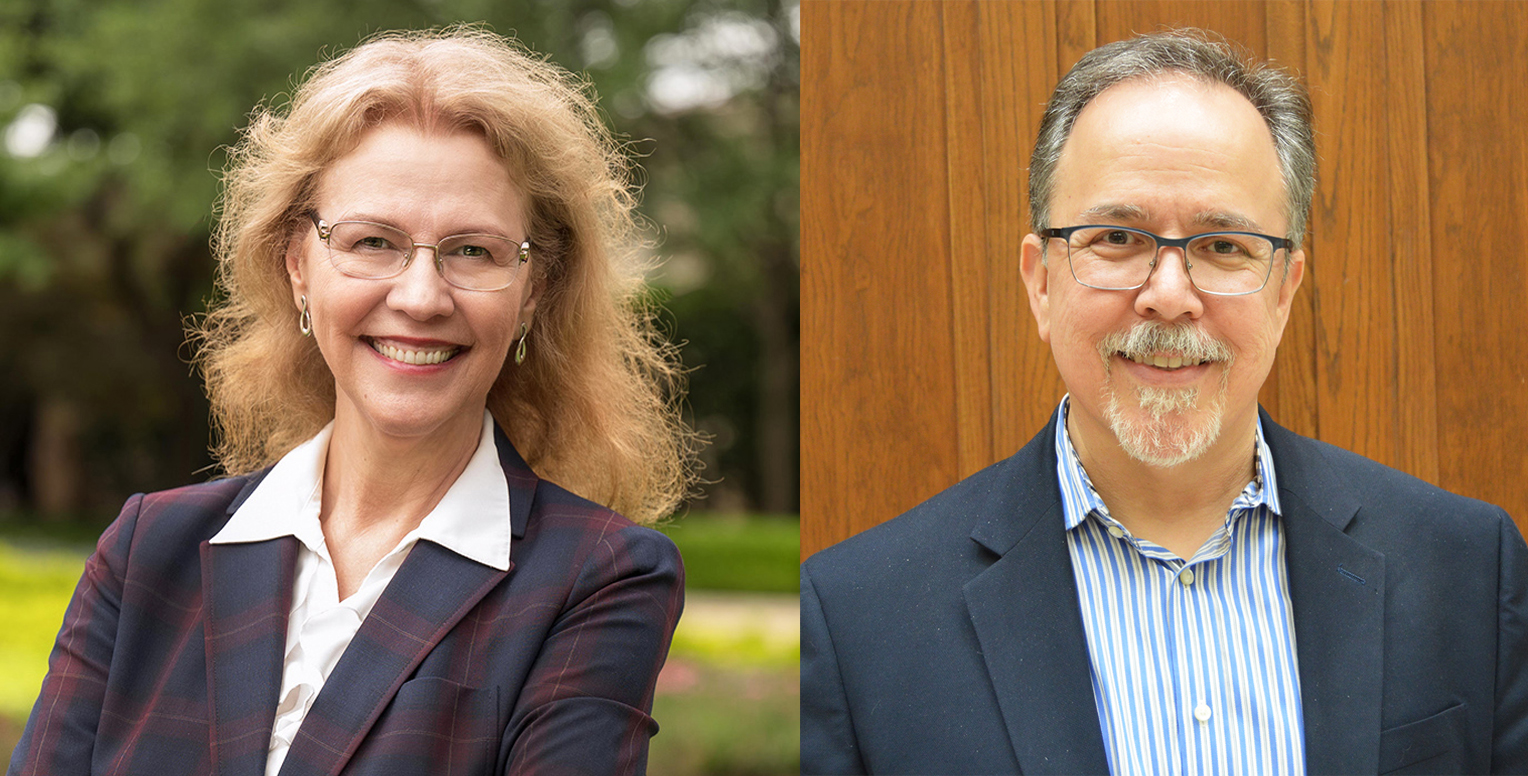Life Sciences Building, Room 206
501 S. Nedderman Drive
Box 19047
Arlington, TX 76019
Cordero, Álvarez featured in book spotlighting Hispanic mathematicians

A new book that highlights the stories of accomplished mathematicians of Latinx and Hispanic heritage features two faculty members from The University of Texas at Arlington.
Minerva Cordero, College of Science senior associate dean for research and graduate studies and distinguished teaching professor of mathematics, and James Álvarez, distinguished teaching professor of mathematics, are included in the book, which is titled Testimonios: Stories of Latinx and Hispanic Mathematicians.
The book is a co-publication of the American Mathematical Society and the Mathematical Association of America. It can be purchased online at the AMS Bookstore site.
The publicationcompiles 27 first-person narratives from the vibrant and diverse Latinx and Hispanic mathematical community. Starting with childhood and family, the authors recount their own individual stories, highlighting their upbringing, education, and career paths. Their stories, told in their own voices and from their own perspectives, give visibility to some of the experiences of Latinx and Hispanic mathematicians.
“It is an honor to be included in this volume dedicated to highlighting the work of mathematicians who are of Hispanic and Latinx origin,” Cordero said.“I am pleased to see it published this year during Hispanic Heritage Month.”
The book seeks to inspire the next generation of Latinx and Hispanic mathematicians by featuring the stories of people like them. It also aims to provide a window for mathematicians (and aspiring mathematicians) from all ethnicities, with the hope of inspiring a better understanding of the diversity of the mathematical community.
“I am honored to be included in this book,” Álvarez said. “The editors, especially Dr. Pamela Harris and Dr. Alicia Prieto-Langarica, had a great vision to not only spotlight Hispanic mathematicians, but also have them specifically address their pathways to mathematics and academia from the perspective of how their identity and experiences as a Hispanic/Chicano/Latinx dovetailed with their journey.”
Cordero said she is enjoying reading the biographies of the other mathematicians featured in the book and added she was humbled when asked to participate in the project.
“This book is a great resource for classrooms throughout the nation to show Hispanic students the work being done by people that look like them,” she said. “I know several outstanding Hispanic mathematicians who I was sure would be included in the book, and indeed, they were. To be included in this work alongside those mathematicians that have been my heroes all along is very exciting and quite humbling.”
Álvarez said that the book’s focus on Hispanic and Latinx mathematicians brings a voice to a group which has traditionally been underrepresented in the mathematics field. He noted that in 1996, the year he received his Ph.D. in mathematics from UT Austin, there were 1,122 doctoral degrees in mathematics awarded in the U.S., but only 11 of those went to Hispanics.
“In fact, although Hispanics make up 17 percent of the U.S. population, they comprise only 8 percent of the STEM workforce and no more than 3 percent of the Ph.D.s in mathematics,” he said.“One fascinating aspect of this book is the diversity in the testimonios that range from stories of extreme hardship to extraordinary experiences and opportunities that advanced mathematical trajectories. The role of family, past experiences, and confronting challenges presented in each of the stories provides readers with many examples they can use to shape their own journey to becoming a mathematician.”
Cordero has long been involved in the effort to increase participation in STEM disciplines by women and underrepresented groups. She served as one of 125women ambassadors in the inaugural class of the American Association for the Advancement of Science IF/THEN Ambassador program, which provides young girls with high-profile role models to inspire them to pursue STEM pathways. Prior to that, she spent a year as program director of the National Science Foundation’s ADVANCE and Hispanic-Serving Institutions programs, where she worked to boost participation and advancement of women and other underrepresented groups in academic STEM careers.
She has received numerous awards, including the Ford Legendary Women Award (Mujeres Legendarias de Ford) in 2016; the Great Minds in STEM HENAAC Award in 2016; the University of Texas Regents’ Outstanding Teaching Award in 2009; the Mathematical Association of America (MAA) Texas Section Award for Distinguished College or University Teaching in 2007; and induction to the UTA Academy of Distinguished Teachers in 2005.She joined the faculty at UTA in 2001.
Álvarez has spent more than two decades working to improve mathematics education of teachers as well as undergraduate mathematics achievement and mathematics program development, and school curriculum standards. He has led studies funded by the NSF, U.S. Department of Education, and the Texas Higher Education Coordinating Board, among other sources, designed to find more effective ways to prepare future math teachers and increasing student retention in gateway courses.
Among the many awards he has received are the Distinguished Service Award by the MAA Texas Section in 2017; the University of Texas System Regents’ Outstanding Teaching Award in 2010; the UTA Provost’s Research Excellence Award(received six times); the MAA Texas Section Award for Distinguished College or University Teaching of Mathematics in 2012; and induction to the UTA Academy of Distinguished Teachers in 2012. He also came to UTA in 2001.
---
The UTA College of Science, a Texas Tier One and Carnegie R1 research institution, is preparing the next generation of leaders in science through innovative education and hands-on research and offers programs in Biology, Chemistry & Biochemistry, Data Science, Earth & Environmental Sciences, Health Professions, Mathematics, Physics and Psychology. To support educational and research efforts visit the giving page, or if you're a prospective student interested in beginning your #MaverickScience journey visit our future students page.